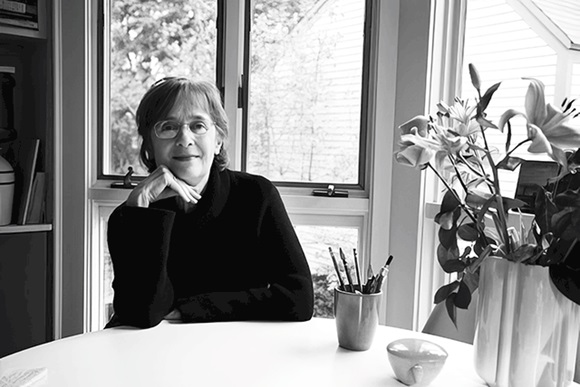 *
*
Recently, the New England Poetry Club awarded poet Gail Mazur its Golden Rose Award. The Golden Rose, one of America’s oldest literary prizes, is awarded annually to a poet who has done the most for poetry during a lifetime. Gail Mazur, besides being a celebrated poet, and teacher, is the founder of the famed Blacksmith House Poetry Series. Founded in 1973, the award-winning Blacksmith House Poetry Series brings established and emerging writers of poetry and fiction to Harvard Square. I got a chance to chat with Mazur, shortly after she received the award.

Doug Holder: Gail, when you started the Blacksmith House Series in 1973, were you connected with the poetry scene or was this an entry point for you?
Gail Mazur: I had moved to Cambridge with my husband, Michael, and our two children, Dan and Kathe, a few years before. The first place my oldest friend, Elsa Dorfman, introduced me to was the Grolier Bookshop. A whole (little) book store devoted only to poetry. I spent many hours there talking with Gordon Cairnie (the already elderly owner – he’d begun it in the late ‘20s) By then it had become an institution. I loved being there, being able to browse and chat with Gordon. When Gordon died in 1972, I thought the “poetry world” of Cambridge was over, so I got the idea to run some readings. (And of course, the poetry world wouldn’t have ended, but that bookstore’s hominess was gone. Now fortunately it’ s been rescued and that little poetry haven should be there a long time.
DH: You have stated in an interview that Robert Lowell was one of your earliest influences. Lowell was part of the “Confessional” school of poets. Do you feel your work is confessional? Isn’t all poetry confessional in some sense?
GM: I guess I think of it as autobiographical! But no, a lot of poetry couldn’t possible be called confessional, unless you mean that we’re revealed somehow in every poems we write! Lowell experienced many episodes of illness and he wrote about the world of it, inner and outer, with brilliant craft and humanity.
DH: You have had a long teaching career. When you teach novice poets, what books do you suggest that they cut their teeth on? This could mean on craft or poetry books themselves.
GM: It varies. It’s such a pleasure to introduce students to poems and poets they don’t know. To discuss the craft of poems. If I look at my shelves, now hundreds of books of poems – well, some days, some students, some weather – different poets!
DH: At the Golden Rose Reading the audience often crackled with laughter. Do you have fun writing poetry, is there a sense of play? I often use humor in my own work, even with poems with the darkest themes.
GM: Sure, sometimes! When it comes through, fun.
DH: Finally, you have had a very accomplished career, with many accolades, awards, books, etc. What does getting the Golden Rose mean to you?
GM: This award surprises and delights me, our community of poets in this area is so varied, we all bring our own stuff to it. As my grandfather would say, also our own mishegas (you can look it up!). I work alone, like all of us, and being in the room with so many writers I admire to receive the Golden Rose just pleases me so much.
















Reader Comments